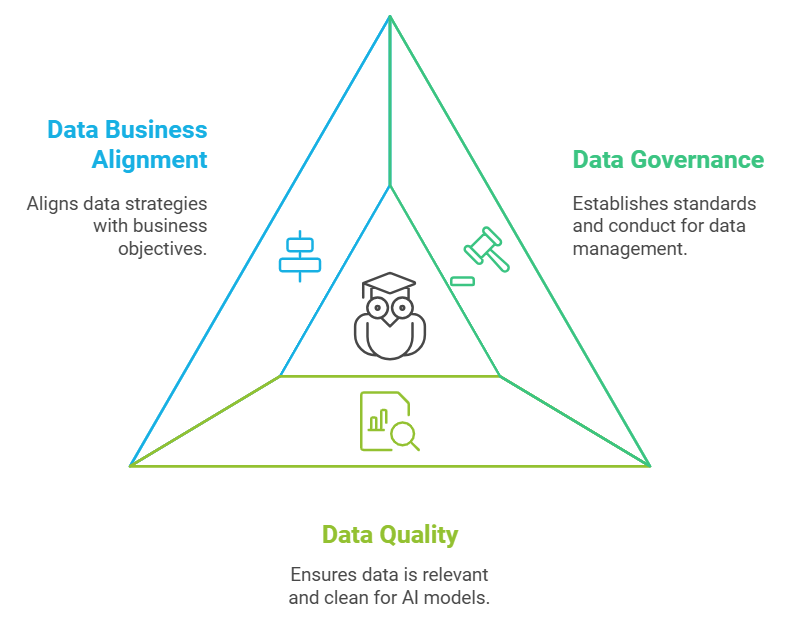Data Leaders Drive Generative AI Innovation Strategies

Generative AI is changing the game in the digital space by allowing machines to develop content, designs, and solutions that are purely human in nature. This technology has the potential to greatly improve productivity and innovation within business industries. However successful generative AI implementation cannot rest on the shoulders of technology alone. There is a compelling relationship between Data leaders and AI, where Data leaders are responsible for the success of AI projects in organizations with clear evidence on Data Governance, Data Quality, and Data Access being highly emphasized. This article looks into the role of data leaders in the development of generative AI strategies and elaborates on how this data can be utilized to create advanced AI applications and enhance competitive business opportunities for organizational development.
Understanding Generative AI: What Is It?
As it relates to the artificial intelligence fields, generative AI is the sub-field that creates new content such as images, text, or music and tries to imitate the statistical properties associated with patterns that can be learned from existing data. With the help of developed machine learning techniques, especially neural networks, AI can generate original output with human-like creativity. Important building blocks such as Generative Adversarial Networks (GANs) and Variational Autoencoders (VAEs) play significant roles in this development.
Generative AI applications are revolutionizing business strategies across industries. In healthcare, it is helping to discover drugs by simulating molecular structures, in marketing it is helping to personalize content to drive engagement with customers. At the same time, data leaders adopting AI innovation are becoming increasingly aware of the essential role that robust data governance plays in supporting the ethical and compliant use of generated data. Generative AI allows organizations to leverage its power to facilitate accelerated transformational change and elevate themselves competitively.
The Role of Data Leaders in AI Initiatives

Innovation in AI technology would not be possible without data professionals, who are the link between the organizational management of data and the strategic direction of the business. Some of the most important functions that fall within their area of responsibility include data governance, data quality, and data business alignment. In relation to AI, they specify the importance of data, that is, data that is both relevant and clean, which is needed for AI model creation.
It needs no emphasis that data governance is vital in AI projects as it provides the conduct and standards to be used in the areas of data quality, data privacy, and data security. Due to the effective governance strategies employed, the data leaders are able to reduce risks and increase the success of AI projects.
Also, data leaders encourage and drive coordination between different functions and departments in the organization, fostering a data-led approach to decision-making. This combined effort empowers businesses to activate different capabilities thus quickening the pace of deploying AI and enhancing business performance. To sum up, data leaders are the key to the effectiveness of AI strategies due to their governance, quality, and alignment with strategy.
Strategic Frameworks for Implementing Generative AI
Implementing generative AI requires a strategic framework that aligns AI initiatives with business goals. Data leaders play a crucial role in this integration, ensuring that AI innovation is both effective and ethical. Effective strategies often involve agile methodologies and iterative development processes, allowing organizations to adapt quickly to new insights and technologies. By fostering collaboration across teams, data leaders can establish robust data governance frameworks that prioritize data quality and security.
Successful examples include tech companies that use agile sprints to refine AI applications, ensuring they meet user needs and business objectives. This alignment not only accelerates the deployment of generative AI but also enhances overall business strategies, driving value and competitive advantage. As organizations embrace generative AI, a well-defined framework will be essential to navigate challenges and unlock its full potential.
Case Studies of Successful Generative AI Implementations
Data leaders’ companies are establishing new benchmarks for AI innovation while industries are being changed by Generative AI. OpenAI is one example where using their models led to increased user retention rates, and it used this to increase customer engagement. And there is another success story of Autodesk, which integrated generative design into its engineering processes and cut down product development time drastically.
These implementations illustrate that incorporating data governance structure, keeping the wheel moving in adherence with compliance guidelines as well as the ethical use of AI can be smart business strategies. Companies realized the need to align generative AI initiatives with company purpose, building and maintaining capable teams who are adept in data management practices. Through these case studies, businesses can learn what might be best to consider when adopting generative AI in order to lift efficiency and spur innovation. By thus embracing, organizations can place themselves to leverage the transformation power of generative AI.
Challenges Faced by Data Leaders in Generative AI
Data leaders face several challenges in harnessing generative AI effectively. One significant obstacle is data silos, where fragmented data limits access and hinders collaboration. Compliance issues, including regulatory constraints, can also impede AI innovation, as leaders must navigate complex legal landscapes. Furthermore, technological limitations, such as insufficient infrastructure and inadequate algorithms, can restrict the deployment of generative AI solutions.
To overcome these challenges, data leaders should prioritize data governance by implementing centralized data management systems that enhance accessibility. Adopting robust business strategies that include cross-department collaboration can break down silos. Additionally, fostering a culture of continuous learning and adaptation is crucial; keeping teams updated on the latest advancements in AI technology will empower them to innovate and respond to emerging challenges.
By addressing these obstacles, data leaders can unlock the full potential of generative AI and drive impactful business outcomes.
Future Trends in Generative AI and Data Leadership
The business landscape will handle the evolution of generative AI technologies as it will form an integral part of the different business strategies across many industries. Future forecasts and predictions hint at an even greater increase towards AI creativity which will greatly improve the functions of content production, design, and decision-making. For this, data leaders will be required to augment their current capabilities with new skills such as innovative data governance or AI ethics. With AI systems becoming more ubiquitous, there is an increasing expectation of AI systems functioning with higher levels of reign, duty of care, and data protection. Because of this, data ethics will be fundamental to the leaders in using generative AI within the established frameworks.
Incorporating ethical aspects into the cultures of organizations while developing AI will increase trust while satisfying all regulatory requirements. Therefore, in order to remain relevant, data leaders will have to adopt a hybrid approach to their roles that is multi-faced containing technical and ethical dimensions. This kind of practice will allow the usage of generative AI and the place of business principles and ethics in the context of information society and business relations to remain unharmed. Altering the perspectives of the AI revolution on core data governance values and the concepts of responsible AI development will be quite important for successful change.
In Summary, As we know the significance of data leaders in shaping the future of generative AI is unavoidable. They are critical to driving strong data governance and AI innovation in every organization. By combining business strategies that are focused on data quality and ethical concerns, companies can unlock the true potential of generative AI. Moving forward, organizations must look into these strategies and embed them in their practices. Take actionability today so that you can be more of a generative AI-empowered organization and let the data leaders run this generative AI-driven, transformational journey.
Be at the forefront of technological innovation! Join our vibrant community to unlock expert insights, exclusive content, and the latest news on AI, IoT, and cutting-edge retail solutions. Stay informed, get inspired, and be part of the conversation—subscribe digitalexperience.live today for your gateway to the future!
FAQs
1. What is generative AI, and how does it impact business strategies?
Generative AI is a branch of artificial intelligence that creates new content—like images and text—by learning from existing data. It enhances productivity, fosters innovation, and allows for personalized customer experiences, helping companies streamline operations and gain a competitive edge.
2. How do data leaders influence generative AI initiatives?
Data leaders oversee data governance, ensure data quality, and align AI projects with business goals. By establishing frameworks for data integrity and fostering cross-department collaboration, they enhance the adoption and effectiveness of generative AI initiatives.
3. what issues do data leaders encounter while deploying generative AI?
Data silos, compliance issues, and limitations in technology all present challenges for data leaders. To address these, they need to ensure data governance, encourage collaboration, and instill a culture of constant learning surrounding AI development.
4. What future trends should data leaders anticipate in generative AI?
Data leaders should expect trends like a greater focus on ethical AI management and advanced data governance. As transparency and accountability in AI grow in importance, blending technical skills with ethical considerations will be vital for driving sustainable innovation.



